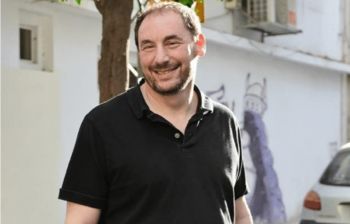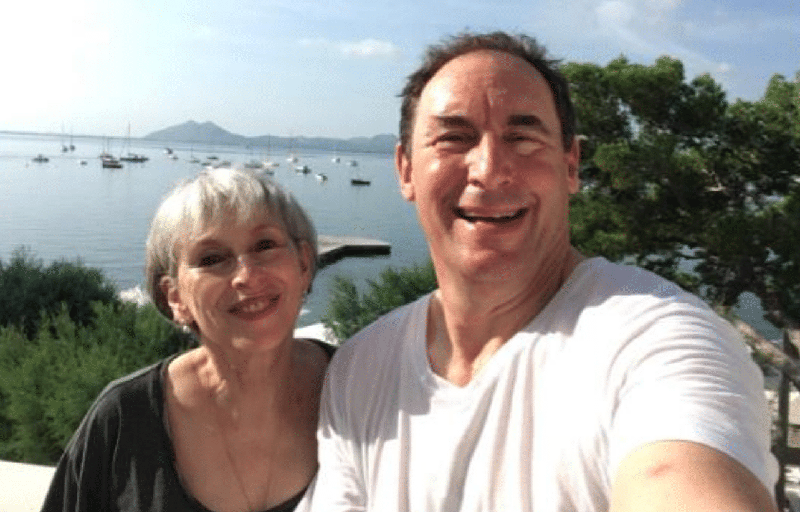By Charles Gardner —

College lecturer and evangelist Richard Harvey faced two main obstacles as he considered the validity of the Christian faith while at school in Winchester.
Firstly, he was Jewish – his family (formerly known as Hirschland) fled Germany with the rise of the Nazis and many of his relatives perished in the concentration camps. And then there was the question of Jesus being raised from the dead, which he couldn’t get his head around.
Most of the boys at this elite public school were nominally Christian, with only a few taking it seriously. Richard tried to prove the latter group wrong while at the same time immersing himself in classic literature. But these books didn’t give him the ultimate answers for which he was looking, and he wondered what life was about.
He regularly attended chapel services – although not a requirement for Jewish pupils – and loved to hear the Song of Simeon chanted (from Luke’s gospel).
Simeon was a devout Jew who had received a promise from God that he would see the Messiah before he died. And when the infant Jesus was brought into the temple to be blessed, Simeon expressed how happy he was to “depart in peace…for my eyes have seen your salvation” (Luke 2:30).
In his book, But I’m Jewish, Richard, now 67, recalls: “I used to wonder if I would ever find that same sense of peace.”
He debated with his Christian friends, but the resurrection was a stumbling block until suddenly, while discussing it, he ‘saw’ an empty tomb.
“I knew that Jesus was not there – that he had in fact risen from the dead. Call it a dream or a vision or just my imagination running riot, but for me there was a ring of truth to it.”
The other obstacle, he thought, was being Jewish. Then an evangelist came to the school and, in conversation with him after one of his talks, he realized it was his pride that was holding him back.
“That night I got down on my knees by my bed and in tears asked Jesus to come into my life and forgive my sin.”
It was around this time that a Christian revival swept the school with up to 70 boys meeting regularly for prayer and Bible study. Richard’s father and brother Nick also became believers. But most Jewish followers of Jesus face a hostile reception from their families and community.
Richard went on to university, changing from politics and economics to theology when he realized he was more interested in what it meant to believe in Jesus. But he developed something of an identity crisis as he was pulled both ways – by Jewish friends wanting him to return to Judaism and by Christians suggesting he was now no longer a Jew.
“As I studied the history of the early church, I found myself asking, ‘Whatever happened to the first Jewish Christians? Why did they disappear, and how can they reappear today?’ I did not know that God would call me to be part of the answer to my own question.”
He subsequently became an evangelist with Jews for Jesus and later for the Church’s Ministry among Jewish people (CMJ), and today is involved with the British Messianic Jewish Alliance as well as lecturing at All Nations Bible College in Hertfordshire, preparing missionaries for service overseas.
Also with a PhD to his name, Richard is married to Monica, who came from a traditional Orthodox Jewish home. She too questioned everything as a teenager, and born-again Christians kept coming across her path, even when she took up the saxophone. For her teacher was also a Christian – and Jewish!
She too got down on her knees in tears crying out to God to show her the way as she knew a decision to follow Jesus would prove costly, especially in terms of family relationships.
Her company duly sent her on a training course where, on the first day, she was paired with yet another born-again Christian who helped her understand how Jewish Jesus was.
“He showed me the prophecy in Isaiah 53 about the suffering servant which sounded uncannily like Jesus! For the first time, it all made sense – I saw that Jesus had come for Jewish people too.”
She finally gave up the fight and surrendered her life to her Messiah at the Queen’s Park Rangers football stadium in London where she went – on her own – to hear Argentinian evangelist Luis Palau. There, in the middle of the park, after the preacher had invited people to come forward and commit their lives to Christ, she broke down and “just sobbed and sobbed,” adding: “I went home that night with a great burden lifted from my shoulders. It felt like I was walking on air. I floated home.”

Jewish evangelism continues to be wrapped in controversy (not much has changed in 2,000 years) and those involved – whether Jew or Gentile – experience widespread hostility, resistance and downright ignorance even from fellow Christians.
As Richard explains: “When Jewish people believe in Jesus, they do not ‘convert’ from being Jews to being Gentiles. Far from it; believing in Jesus is the true fulfillment of what it means to be Jewish.”
There are now some 10,000 Jewish believers (generally known as Messianic Jews) in the UK and approaching one million in North America.



